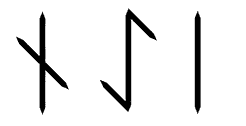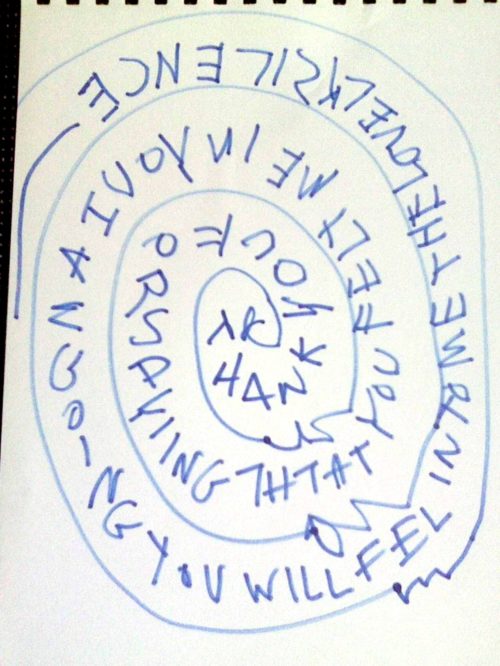A prerequisite for working with the Holy Guardian Angel (HGA) is to attain its Knowledge and Communication. The HGA has been defined in various ways: as the true or higher self; as a dualistic representation of the non-dual; or as the future magickal self. Despite the various methods for attaining the HGA and the diverse definitions of what it is, one characteristic remains constant and implicit: it is wiser than I am.
Recently, I confronted a life-changing choice. I had to decide between two courses of action. The first offered radical change, freedom from what I had long wished to escape, but a risk of serious material hardship. The second entailed biding my time, enduring the limitations on personal freedom I had already tolerated for so long, but remaining materially secure.

I was most inclined towards the first, the direction my heart wanted to take me, but this was not entirely free of anxiety and fear. The second seemed more sensible, yet contemptibly so; I had been wasting my life for too long already, and if now were not the time to break free, then when?
Loved ones expressed concern over what I was proposing to do. In response, I flared up in anger. Did they not understand I had put up with enough already? How little they knew about what I was feeling! As the days passed and I wrestled with the decision, I fell into depression. I was losing sleep and feeling ill. Finally it occurred there was only one way through: I would have to consult my HGA.
I do this rarely and never take it lightly, because experience has shown that my HGA is never wrong. By definition, it cannot be wrong; it is my true or higher self, after all. So I banished the temple space and invoked the angel with a ritual so simple it barely deserved the label: inwardly I recited his name, until I felt his presence. Then I asked my question and drew three runes from a pouch.
The runes provided a response resoundingly pertinent and clear, but it was not the answer I wanted. The message instructed me in no uncertain terms that the time to act was not quite yet. It would not be long, but I had to wait. Things would remain tough, but I had to suck it up. My preferred option would only make things worse in the long run.

This was not what I needed to hear, and it hurt like hell, but soon I started to feel better. How odd, that advice I would not tolerate from loved ones, I could accept from a discarnate being with no material existence! My HGA is never wrong, so there was no question whether this was the right course. Things could indeed be nothing other than shitty for a while, but now I had the backing of my HGA and I knew my interests were – by definition – safeguarded. If this was what the HGA said was best, then I could and would endure it.
There is something special about divination by HGA that sets it apart from a run-of-the-mill tarot spread or I Ching reading. The message received is known to be faultless advice, because its source is tailored specifically to the interests of the questioner. But there is also the sense that, on our part, we are obliged to follow it; to pursue another course would be grossly self-deceiving and self-destructive.
Having access to an infallible oracle makes particular demands upon the magickian. Omniscience is a precious resource and requires protection. Should you wish to develop an oracle with similar properties for your own use, you might like to consider the following:
- If the response is always correct, then it is pointless to consult the oracle on questions we could answer for ourselves. This oracle should never be consulted on questions answerable by another means. For issues on which the questioner cannot decide, but which demand an infallible answer, then consult the HGA. For anything else, another oracle will do. Or try Google.
- If the response is always correct, then it must be adhered to. It is not a “possibility†or a “suggestionâ€; the answer that comes back is binding. If the response is not treated in this way, then it has the status of merely an option or opinion. And what kind of HGA would provide you with only its best guess?
To any skeptical objections, concerning whether this is merely an exercise in self-delusion, and whether it is conceivable that the HGA could have any sort of objective existence, let alone “infallibilityâ€, I make the following reply: these comments are not arguments for or against such things either being or not being the case, but a recipe for creating a certain experience.
“Infallibility†is an experience of such, and to arrive at that experience a certain attitude requires cultivation, in the way I have suggested. That attitude could be described as retreat into delusion, or as a calculated alteration to perception with discrete psychological benefits.
If you feel you might occasionally find it useful to draw on an unfailing and faultless source of guidance (and I have certainly found it helpful down the years) then these are some thoughts that may perhaps enable you to find a means to do so.
























